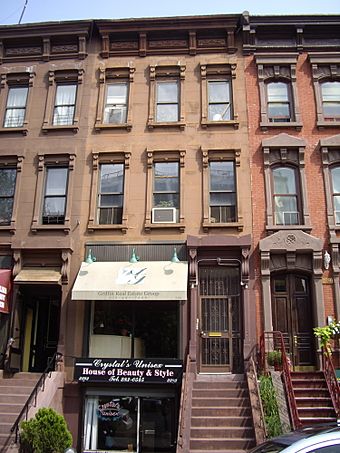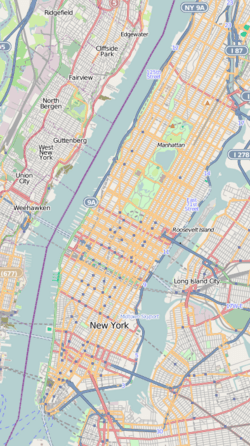New York Amsterdam News Building facts for kids
|
New York Amsterdam News Building
|
|
 |
|
| Location | 2293 Seventh Avenue, Harlem, Manhattan, New York City, New York |
|---|---|
| Area | less than one acre |
| Built | unknown |
| Architectural style | Greek Revival |
| NRHP reference No. | 76001247 |
Quick facts for kids Significant dates |
|
| Added to NRHP | May 11, 1976 |
| Designated NHL | May 11, 1976 |
The New York Amsterdam News Building is a historic building located at 2293 Seventh Avenue in the Harlem neighborhood of Manhattan, New York City. This building is very important because it was the publishing home of the New York Amsterdam News newspaper from 1916 to 1938. During this time, the newspaper became one of the most important publications in the United States that focused on issues affecting African Americans. It was named a National Historic Landmark in 1976. Today, the Amsterdam News is published from a different building nearby.
What Does the Building Look Like?
The old New York Amsterdam News Building is one of four similar buildings in a row. You can find it on the east side of Seventh Avenue, between West 134th and West 135th Streets. It has four floors and is made of brownstone. The building has a classic "Greek Revival" style, which means it looks like old Greek temples with fancy columns and decorations.
The bottom two floors of the building are used for shops. There's a staircase on the right side that leads to the main entrance. The windows and doors have special frames with decorative pillars on the sides.
The Story of the Amsterdam News
The New York Amsterdam News newspaper was started in 1909 by James H. Anderson. He began it from his home on West 165th Street. This was a time when many African Americans were starting to push for more rights and changes. They moved away from older ideas of just accepting things, and instead wanted to take action. Groups like the National Association for the Advancement of Colored People (NAACP) were also formed around this time.
The News quickly became popular and grew very fast. In 1916, it moved into this historic building. At first, it mainly served the local Harlem community. But soon, it started talking about big national issues and reached readers all across the country. Because it grew so much, the newspaper needed even more space. So, in 1938, it moved to its current location.
 | Percy Lavon Julian |
 | Katherine Johnson |
 | George Washington Carver |
 | Annie Easley |




